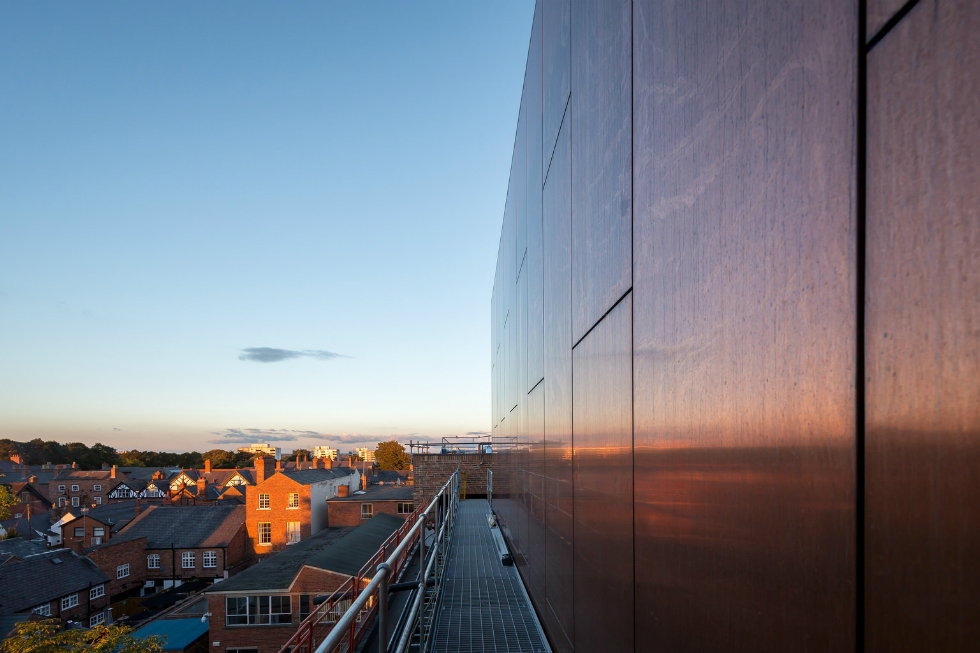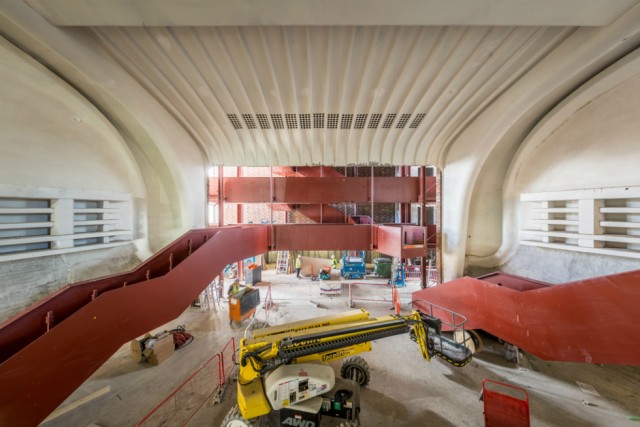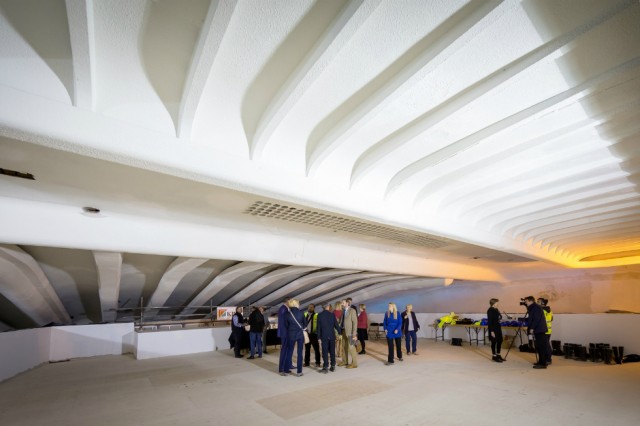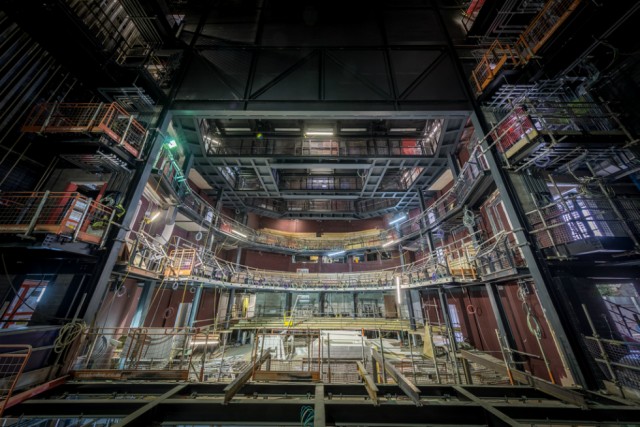“Storytelling will hold this building together”: Introducing Storyhouse, Chester

Chester’s brand new cultural centre enjoys its official launch next Thursday. Ahead of the big day, Hannah Allan speaks to its staff and local residents to understand the area’s creative needs, and the huge expectations already placed at Storyhouse’s door…
Thinking of Chester might conjure up romantic images of Roman walls, or its arcade-style Rows walkways. Yet this perception of the city as a living museum is one which its newest development seeks to change. Due to open on Thursday 11 May, Chester’s flagship arts centre Storyhouse aims to become a hub for the local community, encouraging engagement with the arts in a city which has no other large-scale cultural provision. This lack poses a challenge to the Chester area and other regional hubs outside of the major centres of Manchester and Liverpool; asking if investment in arts might be the solution for marking out a space, identity and method for survival within an uncertain political and economic terrain. Can a new building instigate change or sustain culture?
Situated close to North Gate retail and leisure development, the whole area is one in transition. The £37 million Storyhouse project – backed by Chester City Council and Arts Council England – is centred around a redevelopment of the 1936 Odeon cinema space, which visitors can now take a sneak peek of ahead of the grand opening. Incorporating core library services for the city, there is an adjoining new build housing a 800 seat theatre, 150 capacity studio stage and rooftop bar. This cultural hub approach – in a similar format to The Atkinson (Southport) or HOME (Manchester) – is intended to foster a greater inclusivity and sustainability for all aspects of the new building and its future activities.
Storyhouses’ opening season includes four well-known plays, three of which will be staged outdoors via the popular Grosvenor Park Open Air Theatre, and there are plans to draw in internationally touring productions and companies, with experimental and local practitioners housed in the studio. Open air cinema Moonlight Flicks is showing a crowd-pleasing mix of blockbusters, from La La Land to Moana, and live music includes a blend of world, classical and experimentation, of which Craig Charles’ interpretation of Red Riding Hood, Tales Of The Dark Woods, is a highlight. Walking around the library and cinema, much of the character of the original Odeon can still be seen; the art-deco lines of the roof complement architectural details and the odd salvaged find – such as an original sofa – which feels important in terms of the city’s heritage, but also significant for residents. The cinema holds tangible memories for many of those who grew up here: childhood visits, first dates and family outings.
Formerly known as Chester Performs, the Storyhouse team could be classed as a safe pair of hands, having run the aforementioned Grosvenor Park Open Air Theatre, Rogues’ Galleries, and other cultural events in Chester since 2009. It is overseen by Artistic Director Alex Clifton, who returned to his hometown from working in London as a freelance director and teacher at RADA. Clifton spoke to me of the need to create a “deep and sustained impact” on the lives of people through this work, and that creating this meaningful change has necessitated a long-term building of relationships. At the heart of Storyhouse‘s plan is to engage the community whilst attracting out of town visitors and tourism.

The team, it seems, recognise that Storyhouse’s work isn’t over once the ribbon has been cut. To address this, one initiative is to partner with local charities; sharing some of Storyhouse’s multi-purpose spaces for workshop, volunteering and apprenticeship usage. These newly incorporated groups include Fallen Angels, who teach dance to adults in recovery from addiction; Bridge Foyer, who support 16–24 year olds at risk of homelessness; and Passion For Learning, who focus on the literacy skills of vulnerable young children. By drawing in wider networks of local people who are traditionally less likely to participate in Storyhouse’s programming, Storyhouse is therefore encouraging uptake from all sectors of the community – an aim which Clifton enthusiastically champions. Activities, Clifton tells me, should challenge the community by “asking questions about shared identity… Storytelling is what will hold this building together.”
But what about that community? Chester is a relatively small city of 80,000 permanent residents. The University of Chester attracts an additional 15,000 students per year, and will no doubt be an essential audience for Storyhouse to tap into. Traditionally, smaller cities and towns (and campus universities) can struggle to merge shared spaces between the two groups. It is hoped that students will be further integrated into Chester’s services and public life with the opening of Storyhouse; preferring to use its public library, café, cinema and theatres after lectures, rather than being lured back to the neighboring cities of Liverpool and Manchester by train. Graduate retention is a problem; with qualified students moving to bigger cities with better employment opportunities and a larger cultural industry. Whether Storyhouse will in some small way affect graduate retention remains to be seen. One step to encourage graduating theatre practitioners is Storyhouses’ offer of studio time for new companies who choose to remain in the area. It is a helping hand for start-ups in the areas that they need most help: a permanent base, facilities, resources, and contacts in a blossoming local theatre network that is linked to national productions.

Angela Ferguson, who runs the culture blog We Are Chester, spoke at length to me about the attitude of Chester towards Storyhouse. Ferguson has been collecting residents’ opinions on the project through a radio programme. Generally, Storyhouse was identified as something sorely needed, with guests pointing out that since 2007 there has not even been a cinema in the city. There is obviously a huge weight of expectation placed on the project, yet many are encouraged that the team behind it have been, for several years, producing popular theatre productions during the summer months.
Ferguson also highlighted that residents question why it has taken so long for this cultural provision to be put in place by Chester Council. So far, the response to Storyhouse has been overwhelmingly positive within online discussions and local media reports; the enthusiasm suggesting a keen desire for a contemporary cultural centre to be successful in Chester, and attracting much-needed new visitors.
Despite high expectations, of course, not all requests can be met. One key lack of provision remains, and that is within Chester’s visual arts offer. Storyhouse will provide a limited series of digital screens for exhibiting art on the ground floor, but it will not be expected to act as a gallery. Its Arts Council funding has been awarded based on the offer of theatre and digital content, with its film and library services supported by other awarding bodies. Furthermore, Chester Council’s development plans does not currently include any further strategy for gallery spaces in the city centre. Clearly, Storyhouse cannot meet every community need and should play to its strengths in theatre (Chester has a strong tradition of theatre, in part due to an enduring legacy of its Mystery Plays dating back to the middle-ages. Theatres have come and gone in smaller locations – the Gateway closed its doors in 2007 – and at a grassroots level, but outdoor performances are persistently popular), but a void in the city’s art scene remains.
This absence is made even more apparent considering the University offers degrees in Fine Art and Photography, yet there is no venue for contemporary art outside of the municipal Grosvenor Museum, and a smattering of small commercial galleries. The University’s Contemporary Art Space Chester (CASC) has recently closed, becoming Fashion degree studios at the start of the academic year.

Unlike Liverpool or Manchester, Chester does not have a contemporary cultural legacy that overshadows its ability to write a new version of itself. There is no expectation of a past to be emulated, and instead, new traditions and experimentation might be introduced. One of the questions which arises from this absence of “house style” is who is responsible for ensuring that a city’s cultural offer is well rounded – or that recognising specialisms might be essential to survival. The city has an already well-established audience for the performing arts, so rightly this has been Storyhouse’s focus for investment. Such large-scale council funding for an untested offer might have caused more controversy than this proposal. Instead, Chester Council could support contemporary visual arts by offering up empty shop space for installations (like the aforementioned Chester Performs’ Rogue Galleries programme in 2013), or in assisting groups to start their own studios, galleries, art fairs or magazines. A mixture of both funded and grassroots activity is essential, particularly in giving a platform for voices counter to the prevailing political or cultural narratives the council and funders promote.
A project on the physical and financial scale of Storyhouse is one which will always feel risky. We have seen money poured into areas of the UK subsequently be cut-off, like with Newcastle at the turn of the century, with dramatic consequences for its larger venues and organisations. A sustainable space for uncertain times needs to adapt and challenge existing models. In the case of Storyhouse, this has taken shape through a broader cultural offer.
Buildings do not instigate change or sustain culture alone. However, with an initial commitment to the different audiences and community groups of Chester, in varied fields of performance arts and film, Storyhouse has the potential to become a valued addition. Whether positivity is enough to maintain the project in the long-term is an unknown, but perhaps a space such as this – with so much enthusiasm from its locals – has a better chance than one existing alongside rivals in a larger urban setting. Chester’s residents have waited over a decade for a new arts centre, and it has been hard fought for. Whatever the future challenges faced by cultural institutions nationally, Storyhouse has the attention of a potential audience who recognise the value of such a space in the ecology of their city.
Hannah Allan
This article has been commissioned by the Contemporary Visual Arts Network North-West (CVAN NW), as part of a regional critical writing development programme funded by Arts Council England — see more here #writecritical
Storyhouse opens Thursday 11 May 2017 in Chester
Images, from top: Storyhouse exterior shot; foyer, roof of cinema and theatre, taken during building works. Feature image, exterior shot. All images courtesy Storyhouse





